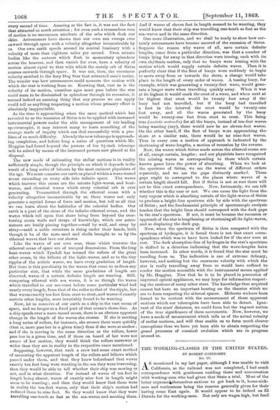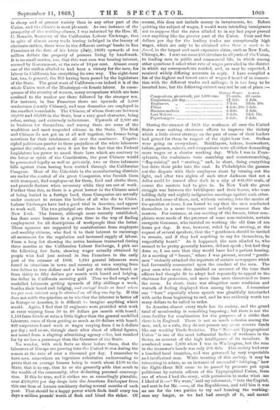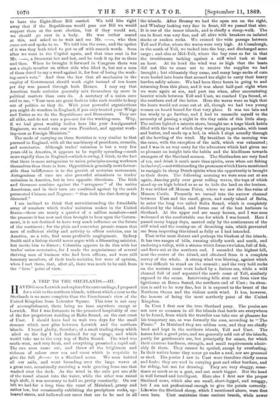THE WORKING-CLASSES IN THE UNITED STATES, .
A S mentioned in my last paper, although I was unable to visit California, as the railroad was not completed, I had much correspondence with gentlemen residing there and conversation with working-men who had given that State a trial. Most of the latter expressedstheinselves anxious to get back to it, home-sick- ness and restlessness being the reasons generally given for their having come East again. It would appear to be indeed an El Dorado for the working-man. Not only are wages high, but foo& is cheap and of greater variety than in any other part of the Union, and the climate is most pleasant. As one instance of the prospe.rity of the, working-classes, I was informed by the Hon. H. C. Bennett, Secretary of the Californian Labour Exchange, that in spite of almost every trade having indulged in the luxury of obstinate strikes, there were in the different savings' banks in San Francisco at the date of his letter (Jaly, 1868) upwards of ten milliou dollars the property of persons living by handiwork. It is no small matter, too, that this vast sum was bearing interest, secured by Government., at the rate of 10 per cent. Almost every one of the strikes alluded to had been a victory for the men, for
labour in California has everything its own way. The eight-hour law, too, is general, the Bill having been passed by the legislature of the State. The great want of California—as indeed it is of the whole Union west of the Mississippi—is female labour. In conse- quence of the scarcity of women, many occupations which are here confined to the weaker are there followed by the stronger sex.
For instance, in San Francisco there are upwards of 5,000 .washermen (mostly Chinese), and men domestics are employed in
the smallest households. The Chinese, of whom there are between 50,000 and 60,000 in the State, bear a very good character, being sober, saving, and extremely industrious. Upwards of 2,000 are in business for themselves, and among these are some of the wealthiest and most respected citizens in the State. The Irish and Chinese do not get on at all well together, the former being notorious for their intolerance all over the continent. Unprin- cipled politicians pander to these prejudices of the white labourers against the yellow, and were it not for the fact that the Federal
Legislature has power to annul State Laws which are contrary to
the letter or spirit of the Constitution, the poor Chinese would be persecuted legally as well as privately, two or three infamous bills against them having been carried through the Californian Congress. Most of the Celestials in the manufacturing districts are under the control of six great Companies, who furnish them with transport, find employment for them, feed and clothe them, and provide doctors when necessary while they are out of work. Further than this, as there is a great horror in the Chinese mind of being buried in a foreign land, these Companies are actually under contract to return the bodies of all who die to China. Labour Exchanges have had a good trial in America, and appear to work well. The two principal are those in San Francisco and New York. The former, although more recently established, has done more business in a given time in the way of finding employment for all descriptions of workpeople than the latter.
These agencies are supported by contributions from employers and wealthy citizens, who find it to their interest to encourage all movement for the regulation and increased supply of labour.
From a long list showing the entire business transacted during three months at the Californian Labour Exchange, I pick out the following few facts, showing wages actually obtained by people who had just arrived in San Francisco in the early part of the summer of 1868. 1,844 general labourers were found in situations in town and country at rates varying from two dollars to two dollars and a half per day without board, or from thirty to fifty dollars per mouth with board and lodging, the dollar in California meaning gold. Thus we find rough and unskilled labourers getting upwards of fifty shillings a week,
besides their board and lodging, and savings' banks at hand where ten per cent. interest may be obtained on all they can lay by. If this
does not settle the question as to whether the labourer is better off in Europe or America, it is difficult to imagine anything which would. Again, I find that 37 engineers were provided with work at rates varying from 50 to 80 dollars per month with board ; 1,164 farm hands at rates a little higher than the general unskilled labourers, some of them getting as much as GO dollars with board.
409 carpenters found work at wages varying from 3 to 5 dollars per day ; and so 011, through sheet after sheet of official figures, not issued from a claptrap advertising agency office, but vouched for by no leas a personage than the Governor of the State.
No wonder, with such facts as these before them, that the labourers of Europe are pouring into the United States during the season at the rate of over a thousand per day. I remember to have seen somewhere an ingenious calculation endeavouring to prove that an average human being is worth about £100 to the State, that is to say, that he or she generally adds that much to the wealth of the community, after deducting personal consump- tion. If this be true, and it strikes me as exceedingly plausible, over .£100,000 per day drops into the American Exchequer from this one item of human machinery during several months of each year. That should be a happy power which finds itself every ten days a million pounds' worth of flesh and blood the richer. Of
course, this does not include money in investments, &e. Before quitting the subject of wages, I would warn intending immigrants not to suppose that the rates alluded to in my last paper prevail over anything like the greater part of the Union. Four and five dollars per day for the leading trades are exceptionally high wages, which are only to be obtained when there is work to be found, in the largest and most expensive cities, such as New York, Chicago, &c. I sent out some 250 circulars to all parts of the Union, to leading men in public and commercial life, in which among other questions I asked what rate of wages prevailed in the district in which my correspondents resided, and, as may be expected, I received widely differing accounts in reply. I have compiled a list of the highest and lowest rates of wages I heard of in connec- tion with the different trades and callings; it is too long to be inserted here, but the following extract may not be out of place :- highest Wages. Lowest.
Compositors, piecework, per 1,000 ems 75 cents. GO cents.
Carpenters, per day 4 dols. 2 dole.
Engineers, „ 5 dols. 2dols. 50c. Filers 4 dols. 50c. 2 dols.
Harness-makers 3 dots. 2 dols.
Last Makers 3 dols. Idol. 75c.
Paperhangers 3 dols. 2 dols.
During the summer of 1868 the workmen all over the United States were snaking strenuous efforts to improve the victory which a little clever strategy- on the part of some of their leaders had gained for them in respect of the eight-hour law. Strikes were going on everywhere. Bricklayers, bakers, ironworkers, tailors, gasmen, miners, and compositors were all either demanding more wages or a shorter working day. While I was in Penn- sylvania, the coalmiuers were marching and countermarching, "flag-raising" and "orating," and, in short, doing everything but drive their picks into the coal. In Philadelphia the gasmen cut the dispute with their employers short by turning out the light, and after two nights of such utter darkness that not a dollar could be turned after dark in a city of 800,000 souls, of course the masters had to give in. In New York the great struggle was between the bricklayers and their bosses, who were holding daily and nightly indignation meetings against each other. I attended some of these, and, without entering into the merits of the question at issue, I am bound to say that the men conducted themselves in a more temperate and orderly manner than the masters. For instance, at one meeting of the former, bitter com- plaints were made of the presence of some non-unionists, certain energetic Germans, who insisted on working the old time of ten hours per day. It was, however, ruled by the meeting, at the request of several speakers, that the "gentlemen should be invited to remain, and if they had anything to say for themselves, be respectfully heard." As it happened, the men alluded to, who seemed to be pretty generally known, did not speak ; but had they done so, I am sure that they would have had a patient hearing.
At a meeting of " bosses," where I was present, several "gentle- men ' violently attacked the reporters of certain newspapers which had favourably commented upon the conduct of the men. The poor men who were thus insulted on account of the tone their editors had thought fit to adopt had repeatedly to appeal to the chairman for protection, and more than once threatened to leave the room. In short, there was altogether snore confusion and warmth of feeling displayed than among the men. I remember one "boss" especially whose speech was plentifully interlarded with oaths from beginning to end, and he was evidently worth too many dollars to be called to order.
In America almost every trade has its society, and the grand total of membership is something imposing; but there is not the same facility for combination for the purposes of a strike that there is in England. There is not so much cohesion among the men, and, as a rule, they do not possess any great reserve funds like our wealthy Trade Societies. The " Natienal Typographical Union" is one of the most influential bodies of workmen in the States, on account of the high intelligence of its members. It numbered some 7,000 when I was in Washington, but the sum in the treasurer's hands was only 204 dols. This society had over a hundred local branches, and was governed by very respectable and intellectual men. While treating of this society, it may be interesting to relate, as an instance of succeseful " lobbying," how the Eight-Hour Bill came to be passed by pressure put upon politicians by certain officers of the Typographical Union, from one of whom I had the story, with permission to make what use I liked of it :—" We went," said my informant, "into the Capitol, and sent in for Mr. —, of the Republicans, and told him it was
no use for the two parties to try and humbug the working- men any longer, as we had had enough of it, and meant to have the Eight-Hour Bill carried. We told him right away that if the Republicans would pass our Bill we would support them at the next election, but if they would not, we should go over in a body. He was rather scared at this, and asked us to wait and see Mr. —, who then came out and spoke to us. We told him the same, and the upshot of it was they both tried to put us off with smooth words. Soon after we went to the Capitol again, and that time sent in for Mr. —, a Democrat hot and hot, and he took it up for us there and then. When he brought it forward in Congress there was not a single member on either side who liked it, but not a man of them dared to say a word against it, for fear of losing the work- ing-men's vote." And thus the law that all mechanics in the employ of Government should work eight instead of ten hours per day was passed through both Houses. I may say that American trade societies generally mix themselves up more in political matters than ours do. A secretary of a union once said to me, "Your men are great fools to take such trouble to keep out of politics as they do. With your powerful organizations you might do wonders in England, if you only treated your Whigs and Tories as we do the Republicans and Democrats. They are all alike, and do not care a pea-nut for the working-men. Why, if we had great wealthy bodies here like your Amalgamated Engineers, we would run our own President, and appoint work- ing-men as Foreign Ministers."
The mode of carrying on these Societies is very similar to that pursued in England, with all the machinery of presidents, councils, and secretaries. Although trades' unionism is but a very few years old in America, it appears to be rapidly spreading—much more rapidly than in England—which is owing, I think, to the fact that there is more antagonism to union principles among workmen themselves than there is here. Opposition is generally more favour- able than indifference is to the growth of sectarian movements. Antagonisms of race are also powerful stimulants to trades' unionism in America, but in two opposite directions. The Irish and Germans combine against the " arrogance " of the native Americans, and in their turn are combined against by the much persecuted Chinese and Negroes : "thus doth the dust destroy the diamond."
I am inclined to think that notwithstanding the formidable array of numbers which trades' unionism makes in the United States—there are nearly a quarter of a million members—and the pressure it has now and then brought to bear upon the Govern- ment, it is not destined to have very much influence on the future of the continent ; for the plain and somewhat prosaic reason that men of sufficient ability and activity to officer societies, can in America, as a rule, find more profitable employment. Sydney Smith said a bishop should never argue with a Dissenting minister, but invite him to dinner ; Columbia appears to do this with her trades' union secretaries, for I made the acquaintance of several thriving men of business who had been officers, and were still honorary members, of their trade societies, but were of opinion, when I met them, that, after all, there was much to be said from the " boss " point of view.
































 Previous page
Previous page